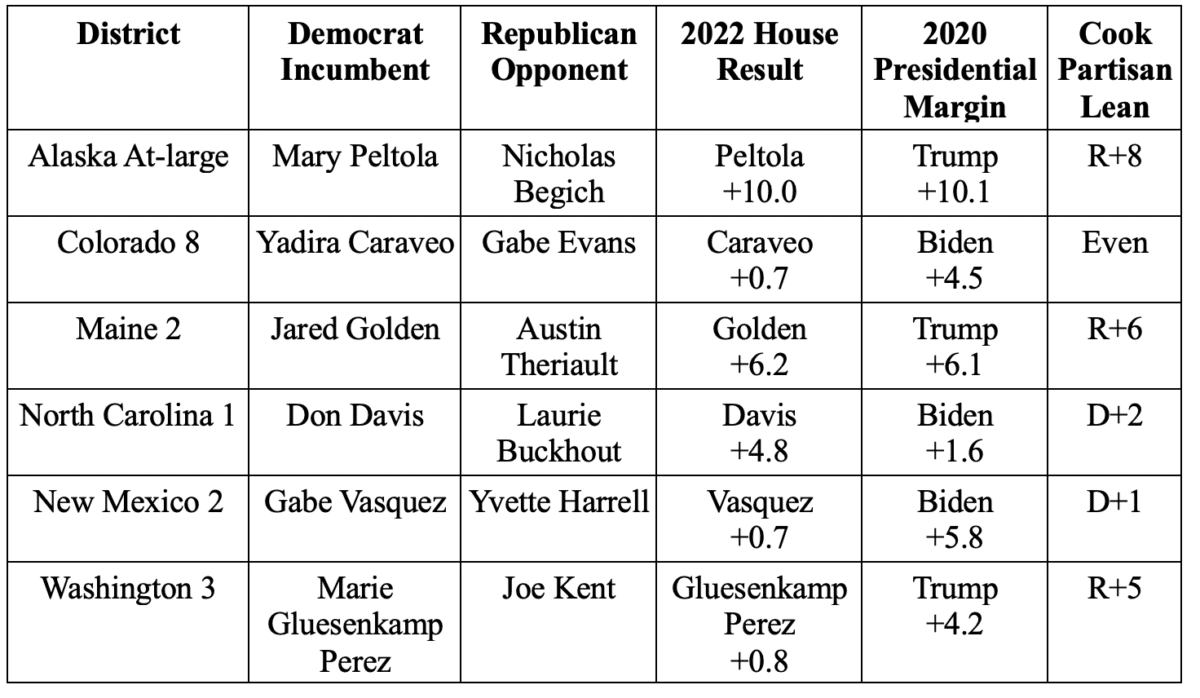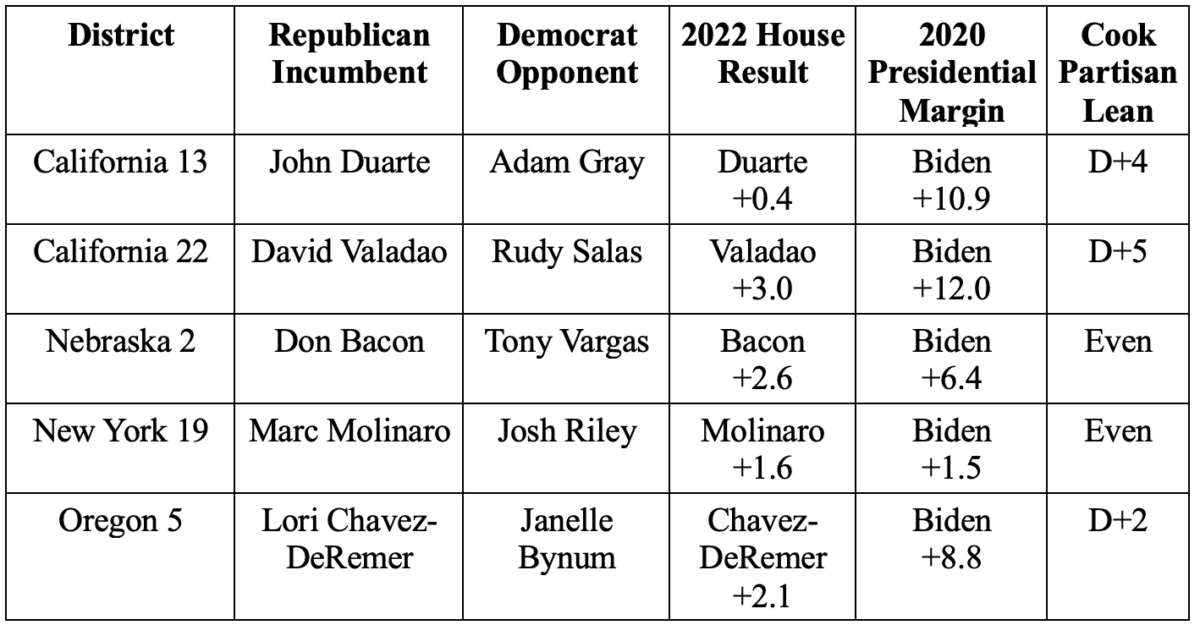Election forecasters predict that 54 “battleground” races in the 2024 election that will determine who controls the U.S. House of Representatives in 2025, with numerous rural and agricultural districts in play. There are 435 seats in the House, which are now occupied by 220 Republicans and 212 Democrats. Three open seats are due to death or resignation. Republicans are expected to retain one of these seats (the Wisconsin 8th), while Democrats are expected to retain two (New Jersey 9th and Texas 18th). Either party needs to win at least 218 seats to control the House.
The 10 Rural Districts That Could Swing the House
Candidates in rural battleground congressional races are pivotal in deciding who controls the U.S. House


Cook Political Report rates 11 seats of the 54 battleground races as “Democrat-incumbent tossups” and 12 as “lean Democrat.” Thirteen seats are considered “Republican-incumbent tossups” and 6 districts “lean Republican.” In 2022, Republicans picked up 10 additional seats to win the House majority. This year, Democrats are expected to win back 2 seats, Alabama’s 2nd and New York’s 22nd congressional districts, due to redistricting.
The following table contains information about 10 rural or rural-related districts that Cook considers a “Tossup.” All 10 districts have incumbents who are members of either the Agriculture Committee or Agriculture Appropriations Committee. These committees are important in determining rural-related budgets and the still-stalled farm bill re-authorization process that is likely to be negotiated in the 119th Congress. Third party candidates are not included in the table.
Democrat Incumbent Tossup Races

Republican Incumbent Tossup Races

The Democrat’s hopes for a House majority are based on retaining first-term incumbents Peltola, Caraveo, Davis, Vasquez and Gluesenkamp Perez. Each of these candidates, except Peltola, serve on the House Agriculture Committee.
Jared Golden has won Maine’s very-rural 2nd district since 2018 despite the six-point Republican lean of the district’s voters. All 6 Democratic incumbents have tended to express their independence over party loyalty, whether by voting to move the Republican House Agriculture Committee farm bill out of committee or by disagreeing with President Biden on select issues, such as his support for additional U.S. military aid to Israel’s occupation of Palestine or his student loan forgiveness program.
Republican plans for retaining their current House majority are dependent on winning some of the less urban districts, such as those currently held by Gluesenkamp Perez, Davis, and Caraveo, along with retaining less rural but large industrial agricultural districts in California’s Central Valley. The Republicans are defending districts where President Joe Biden won with significant majorities.
Both party campaign committees are investing millions of dollars in each of the 10 rural tossup battleground races.
Control of the U.S. Senate is also in contention. Currently, there are 48 Democrats, 49 Republicans and 3 Independents in the Senate. All 3 Independents caucus with the Democrats, giving the Democrats a small majority. The closest races are expected in Ohio, Montana and Michigan, all with large rural voter constituencies. Cook Political Report rates the open Michigan Senate seat and Sherrod Brown’s (D) Ohio seat as tossups, while Montana’s Jon Tester (D) incumbent seat leans Republican. The Democrats will almost certainly lose another seat in West Virginia, with the retirement of incumbent Joe Manchin (I).
Rural voters are critical in determining the outcome of many elections, though more battleground races are in urban or suburban areas. That said, with elections so close in many House districts and several Senate races, small marginal changes by rural voters can contribute to making significant contributions to election outcomes.
Here’s a brief look at a few House candidates:
Marie Gluesenkamp Perez

In Washington’s 3rd district, incumbent Rep. Marie Gluesenkaamp Perez speaks with a member of Randle Veterans Coffee, which meets monthly. Her website proclaims: “Marie Gluesenkamp Perez’s working class roots run deep in Washington State.” Gluesenkamp Perez, who with her husband owns an auto shop, graduated in 2012 from Reed College in Portland. In 2022 she was elected to Congress in a district that Donald Trump won 51 to 47 in 2020. This year she is again up against Joe Kent, an Army Special Forces veteran who claims the Covid-19 vaccines are an “experimental gene therapy” and who employed the consulting services of a Proud Boy member during his 2022 campaign.
Gabe Vasquez

In New Mexico’s 2nd District, Rep. Gabe Vasquez represents a district that is larger in landmass than the state of Pennsylvania. The Democratic incumbent is seen here kicking off Pride Month with Silver City PFLAG. Vazquez, a first generation Mexican American, is a former member of the Las Cruces city council. He is up against Republican Yvette Herrel, who in 2022 Vazquez ousted from Congress, defeating her by 1,350 votes. Herrel is campaigning to win back her seat by running on two issues: border security and crime. Albuquerque, one quarter of which is in the 2nd district, has a rate of violent crime that is almost double the national average.
Lori Chavez-DeRemer

In Oregon’s 5th District, Republican incumbent Lori Chavez-DeRemer, is outside her party’s mainstream, being one of only six Republican House members to sign a pledge to respect the results of the 2024 presidential election. Politico has identified her as the second-most bipartisan member of Congress. This year Chavez-DeRemer is being challenged by Janelle Bynum, a member of the Oregon House who with her husband Mark owns several McDonald’s franchises in the Portland area. Bynum has twice gone up against Chavez-DeRemer in Oregon State House races, defeating her each time.
Don Davis

In North Carolina's 1st District, Rep. Don Davis has the distinction of being the lone Democrat in Congress to co-sponsor a GOP bill to limit Medicare’s ability to negotiate drug prices. He is seen here taking the mic at the Second Annual Pecan Pickling Film Festival in Bertie County. He is up against former defense contractor Laurie Buckhout. On X (formerly Twitter), Buckhout has voiced support for “the Jan 6ers” and identifies herself as: “Mom. Wife. Combat Commander. Business leader. America First Conservative Fighter.” She moved to North Carolina from Virginia in 2021 after selling her company, Corvus Consulting, described on a website for government contractors as a “cyber, spectrum and electronic warfare organization dedicated to providing defense-related consulting services.”
Bryce Oates writes The Cocklebur on Substack and is a Contributing Editor (Rural Community Organizing) at Barn Raiser. He writes about rural policy, people, places and politics. His work includes narrative nonfiction, opinion pieces and Q&A interviews. Bryce studies how the federal budget affects rural counties, farm and food policy, public lands and conservation issues, racial and gender equity in rural areas, climate change, economic inequality, rural demographic data and rural politics. A former farmer, rural economic developer and community organizer, he lives and works in Oregon’s Willamette Valley.
Have thoughts or reactions to this or any other piece that you’d like to share? Send us a note with the Letter to the Editor form.
Want to republish this story? Check out our guide.
More from Barn Raiser

Organic Farmers Unite to Keep Your Food Healthy






